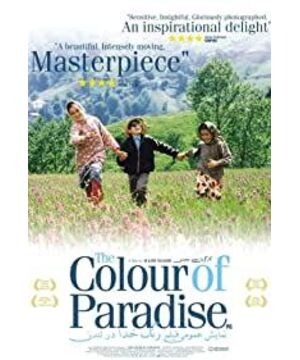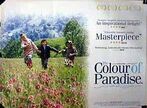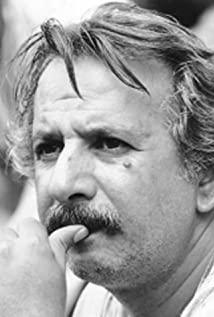the first is that Murman was taken by his father to the blind Arina to learn woodworking, and Ali found Murman crying. He said: "No one loves me, and neither does my grandmother. They don't want me because I'm blind. If I wasn't blind, I could go to school in my hometown like everyone else, but now I have to go to school for the blind. far away. The teacher said that God loves the blind more because the blind cannot see. But I told the teacher that if this is the case, God will not make us blind and cannot see him. The teacher replied 'God is invisible. He is invisible. Everywhere, you can only feel him. You can only see him with your fingers'. Now I reach out to God until my hand touches him, tell him, I'm going to tell him everything. Even from the bottom of my heart All the secrets." In the
second paragraph, Moman's grandmother insisted on going to see Moman, and Moman's father dissuaded him from the side: "You deliberately can't get along with me? I'm doing it for his own good. What should I do now? I did wrong What? To take care of a blind man for the rest of my life, and never get away? Who will take care of me when I am old and sick? Why doesn't your great god come to help me? Why should I thank him? Thank him for giving me nothing Thank him for giving me pain? Thank him for my blind child? Or my dead wife? I've had enough for five years! Think about what you have done for me? Look at me! Poor and miserable, dead since childhood Dad, I have no impression of him, who helps me? Who cares about me? Let's go! Let's see where your love goes!"
In my opinion, these two dialogues best illustrate the director's intentions. In my opinion, the most valuable and respectable thing about the new generation of Iranian directors is that they do not shy away from poverty and suffering. They are describing real life, allowing us to perceive the truth, goodness and beauty in poor villages or mountains. They also use this description to let the audience understand the suffering in society: If the omnipresent God is by my side, why doesn't he help me? If the omnipotent God is by my side, why not come and stop my suffering? The words of Murman and his father are strongly critical. On the one hand, they are deeply unable to extricate themselves from the suffering caused by poverty and Murman being blind, and on the other hand, they are also questioning the grandmother who believes in Allah and the teacher of Murman, why we thank Allah and have not escaped these pains ?
Majid Majid's use of "Colors of Heaven" as the title of the film is itself an irony in a double sense: the blind child Murman can't see the color, and the death of his grandmother, the rejection of his father's revival, and the death of Murman by drowning are by no means Heaven. The title of the color of heaven also brings up the director's expectation of heaven or the future: at the end, the father holds the dead Moman, and Moman's hand gradually begins to shine with golden light, and he begins to open his fingers to look like he did in school. world colors. Hands are the eyes of a blind man. Murman reads books, sees sparrows, and sees his sister and grandma.
A tragic process or ending doesn't tell the whole story. In the first half of the film, the colors are bright and glossy: Murman returns home and sees his grown-up sister and grandma with "so white hands" with his hands. They frolicked together in the vast flowers. That scene also became a poster of the colors of heaven. In this film, if the author uses dialogue to reveal his critical ideas, Majid Majidi uses one-to-one corresponding actions to describe the truth, goodness and beauty in life. The first mapping is Murman and Grandma. Murman waited for his father on the school bench before returning to Canada. He heard the sound of sparrows, not from the trees, but from the ground. So Murman knelt on the ground and groped in the leaves with his hands little by little, until he found the fallen sparrow. Then struggling to climb up the tree to help the sparrows return to the nest. When Murman finally climbs the tree, the mid shot cuts to close-ups, giving Murman a close-up of his expression and hands. A relieved laugh is heaven, while fingers stroke the color of the sparrow. In the later period, when grandma went to find Moman, she saw the fish struggling in the mud. Grandma would grab it, walk to the pond, and gently stretch out her hands. It was also a medium shot and switched to a close shot. The close-up of the Ministry reminds us of the kind-hearted child Murman. The second mapping is Murman and his father. Personally I don't think his father played the role of "Blackface". The first scene is that his father took Moman home. On the country road, Moman broke free from his father's hand. "I want to run home by myself!" So Moman trotted all the way in front, followed by his father, who also acted as a trot. Moman's eyes are "left, right..." The other half of the mapping is in the last paragraph of the movie. Seeing Moman chasing into the water, his father ran along the river bank like crazy, and finally plunged into the water. In the last scene, the father is holding Murman in pain. This is a revealing of true feelings, not a return. Murman's father is a very tangled character throughout the film. Five years after his wife's death, he fell in love with a girl from another family. Their smiles were an indispensable part of conveying truth, goodness and beauty in the whole film. In order to make the marriage go smoothly, his father sent Moman to the woodworker Arina, which was a very contradictory choice: first, he wanted to get rid of the oil bottle that might affect the marriage, the blind Moman; on the other hand, the blood was thick Yu Shui's father also hopes that Morman can take care of Morman's own life in the future. Some people say that the last father's madness is the return of family affection and conscience, sorry, but I don't agree.
At the end of the film, the audience has a lot of room for judgment. The title and poster undoubtedly convey to us a rural village of truth, goodness and beauty, and the author does not shy away from telling their poverty and suffering. Like Majid Majidi's first work, Little Shoes, the director gave us rich space: the life of an ordinary Iranian peasant, and their happiness and suffering; the living conditions of blind children in Iran; the director's message to the audience. Criticism of society and religion; and the most important truth, goodness and beauty in life...
The color of heaven, my interpretation is this: I want people to live more like heaven, and children who have lost their sight can see color.
View more about The Color of Paradise reviews









